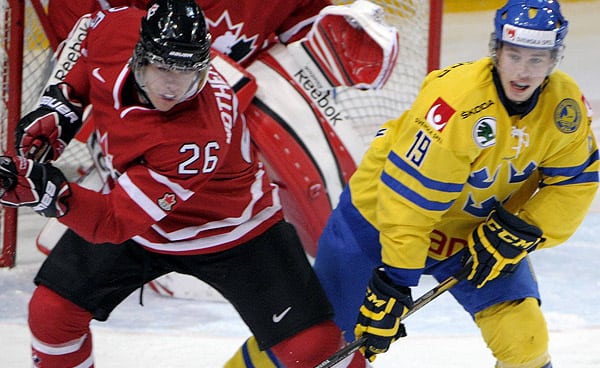
Final thoughts on 2013 WJC
 Final thoughts on 2013 WJC
Final thoughts on 2013 WJCWith another World Junior Championship in the can, it's time to look at some of the storylines that emerged from Ufa and how they might impact the future, when the tourney shifts to Malmo, Sweden for the 2014 instalment.
First, Malmo should be an excellent showcase for local talent. The young Swedes overachieved in Russia, earning a silver medal and going undefeated in tournament play until they ran into the Americans in the final. Forwards Elias Lindholm, Jacob de la Rose and Alexander Wennberg are all draft eligible this summer, as are defensemen Robert Hagg and Linus Arnesson. Far from being buried in the lineup, each of these players contributed to the cause and will be available for next year's squad, as will third-string goaltender Oscar Dansk (Columbus, 31st overall in 2012).
The most disappointing team at the WJC came from Finland, where a stacked lineup sputtered in the round robin and had to settle for routing teams in the relegation round instead of playing for a medal. After the Finns' final game, coach Harri Rindell revealed that a stomach flu had gone through the team, while also admitting that he had trouble finding the right linemates for emerging superstar Sasha Barkov. The 2013 prospect never had the same two wingers twice at the tourney, though he did have success when paired with Buffalo Sabres first-rounder Joel Armia.
After the Finns, some would see Canada as a disappointment since the team finished without a medal for the first time since 1998. While the strengthening of the Swedish and American programs made this inevitable, this particular squad had no excuses: The NHL lockout even granted them a bonus player in Edmonton's Ryan Nugent-Hopkins. Perhaps gun-shy of international officiating, the Canucks played less physical than in the past, though they still managed to accrue a couple ejections and suspensions for body work. But overall this was the least physical tournament I have attended and I wouldn't call it a disadvantage to North Americans, since Team USA won gold and American Seth Jones' big hit on Sweden's Lindholm was one of the best collisions of the tourney. It was unsettling to see Canadians “embellishing” run-ins with the Russians in order to draw penalties in the bronze medal game, however. It worked, but they won't be able to complain about European soccer tactics next time out.
Speaking of officiating, it was once again lacking. Again, I'm not saying this was bias against North America, because the podium speaks for itself, but one international GM (whose team was in the medal round) told me that the lack of any sort of standard was the most frustrating part. It was that old chestnut of “a penalty in the first period wasn't a penalty in the third,” or vice versa. Players didn't know where the line was. On top of that, simple calls such as the puck hitting the netting above the glass were not whistled down during medal games. Fortunately, no goals were scored on those plays, but what if they had been?
Finally, with an eye on the little guy, it was too bad to see Latvia relegated when their best player, Buffalo Sabres first-rounder Zemgus Girgensons, was kept in the American League for duty with the Rochester Americans, but I'm talking myself into next year's German squad. I'm not expecting miracles, but two out of Germany's three best players – goalie Marvin Cupper and leading scorer Leon Draisaitl – will be eligible to return next year, as will Frederik Tiffels, who plays in the United States League for Muskegon. Edmonton pick Tobias Rieder will age out, but he can move on knowing his nation is in good hands and still playing against the best in the world.
(Editor's note: Finland's coach's name spelling corrected; Roger Ronnberg was mentioned as a possibility to return to Sweden's bench, but he was hired by Frolunda. The reference was removed.)
Ryan Kennedy, the co-author of Young Guns II, is THN's associate senior writer and a regular contributor to THN.com. His column appears Wednesdays and The Hot List appears Tuesdays. Follow him on Twitter at twitter.com/THNRyanKennedy.

